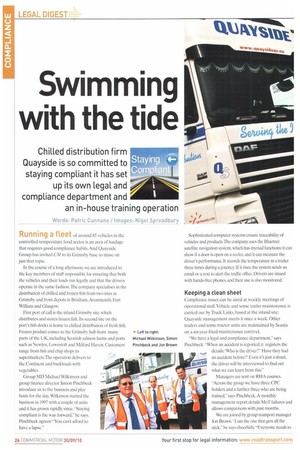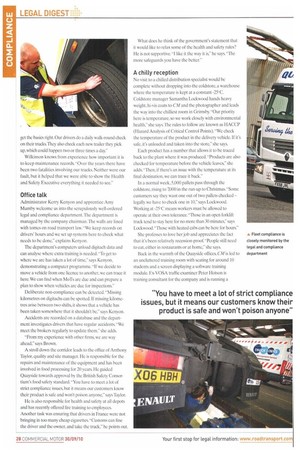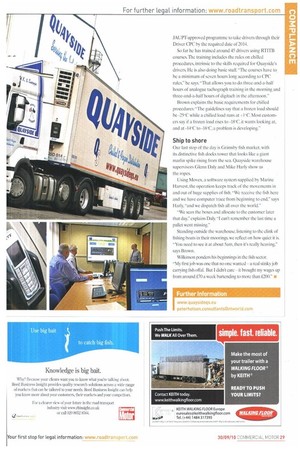Swimming with the tide
Page 26

Page 28

Page 29

If you've noticed an error in this article please click here to report it so we can fix it.
Chilled distribution firm Quayside is so committed to staying compliant it has set up its own legal and compliance department and an in-house training operation
Words: Patric Cunnane / Images: Niget Spreadbury Running a fleet of around 85 vehicles in the controlled-temperature food sector is an area of haulage that requires good compliance habits. And Quayside Group has invited CM to its Grimsby base to muse on just that topic.
In the course of a long afternoon, we are introduced to the key members of staff responsible for ensuring that both the vehicles and their loads run legally and that the drivers operate in the same fashion. The company specialises in the distribution of chilled and frozen fish from two sites in Grimsby and from depots in Brixham, Avonmouth, Fort William and Glasgow.
First port of call is the inland Grimsby site, which distributes and stores frozen fish. Its second site on the port's fish docks is home to chilled distribution of fresh fish.
Frozen product comes to the Grimsby hub from many Left to right parts of the UK. including Scottish salmon farms and ports Michael. Wilkinson, Simon such as Newlyn. Lowestoft and Milford Haven. Customers Pinchbeck and Jon Brown
range from fish and chip shops to supermarkets. The operation delivers to the Continent and barkloads with vegetables.
Group MD Michael Wilkinson and group finance director Simon Pinchbeck introduce us to the business and play hosts for the day-. Wilkinson started the business in 1997 with a couple of units and it has grown rapidly since. -Staying compliant is the way forward," he says. Pinchbeck agrees: -You can't afford to have a lapse."
Sophisticated computer systems ensure traceability of vehicles and products.The company uses the Bluetree satellite navigation system, which has myriad functions: it can show if a door is open on a reefer, and it can measure the driver's performance. It records the temperature in a trailer three times during a journey. If it rises, the system sends an email or a text to alert the traffic office. Drivers are issued with hands-free phones, and their use is also monitored.
Keeping a clean sheet
Compliance issues can be aired at weekly meetings of operational staff. Vehicle and some trailer maintenance is carried out by Truck Links, based at the inland site Quayside management meets it once a week. Other trailers and some tractor units are maintained by Scania on a six-year fixed-maintenance contract.
"We have a legal and compliance department." says Pinchbeck. "When an accident is reported, it registers the details:Who is the driver?' Have they had an accident before?' Even it's just a shunt, the driver will be interviewed to find out what we can learn from this."
Managers are sent on RHA courses. "Across the group we have three CPC holders and a further three who are being trained." says Pinchbeck.A monthly management report details MoT failures and allows comparisons with past months We are joined by group transport manager Jon Brown. am the one that gets all the stick." he says cheerfully. "Everyone needs to get the basics right Our drivers do a daily walk-round check on their trucks.They also check each new trailer they pick up, which could happen two or three times a day."
Wilkinson knows from experience how important it is to keep maintenance records. -Over the years there have been two fatalities involving our trucks. Neither were our fault, but it helped that we were able to show the Health and Safety Executive everything it needed to see."
Office talk
Administrator Kerry Kenyon and apprentice Amy Mumby welcome us into the scrupulously well-ordered legal and compliance department. The department is managed by the company chairman. The walls are lined with tomes on road transport law. "We keep records on drivers' hours and we set up systems here to check what needs to be done," explains Kenyon.
The department's computers unload digitach data and can analyse where extra training is needed. -To get to where we are has taken a lot of time," says Kenyon, demonstrating a computer programme. "If we decide to move a vehicle from one licence to another, we can trace it here. We can find when MoTs are due and can prepare a plan to show when vehicles are due for inspections."
Deliberate non-compliance can be detected. "Missing kilometres on digitachs can be spotted. If missing kilometres arise between two shifts, it shows that a vehicle has been taken somewhere that it shouldn't be," says Kenyon.
Accidents are recorded on a database and the department investigates drivers that have regular accidents. "We meet the brokers regularly to update them," she adds "From my experience with other firms, we are way ahead," says Brown.
A stroll down the corridor leads to the office of Anthony Taylor, quality and site manager. He is responsible for the repairs and maintenance of the equipment and has been involved in food processing for 20 years. He guided Quayside towards approval by the British Safety Consortium's food safety standard. "You have to meet a lot of strict compliance issues, but it means our customers know their product is safe and won't poison anyone," says Taylor.
He is also responsible for health and safety at all depots and has recently offered fire training to employees. Another task was ensuring that drivers in France were not bringing in too many cheap cigarettes "Customs can fine the driver and the owner, and take the truck," he points out. What does he think of the government's statement that it would like to relax some of the health and safety rules? He is not supportive. "I like it the way it is," he says "The more safeguards you have the better."
A chilly reception
No visit to a chilled distribution specialist would be complete without dropping into the coldstore, a warehouse where the temperature is kept at a constant -25"C. Coldstore manager Samantha Lockwood hands heavy weight. hi-vis coats to CM and the photographer and leads the way into the chilliest room in Grimsby. "Our priority here is temperature. so we work closely with environmental health," she says The rules to follow are known as HACCP (Hazard Analysis of Critical Control Points). -We check the temperature of the product in the delivery vehicle. If it's safe, it's unloaded and taken into the store," she says Each product has a number that allows it to be traced back to the plant where it was produced. -Products are also checked for temperature before the vehicle leaves," she adds. "lhen, if there's an issue with the temperature at its final destination, we can trace it back."
In a normal week, 5,000 pallets pass through the coldstore, rising to 7,000 in the run-up to Christmas "Some customers say they want one out of two pallets checked — legally we have to check one in 10," says Lockwood. Working at -25`C means workers must be allowed to operate at their own tolerance. "Those in an open forklift truck tend to stay here for no more than 30 minutes," says Lockwood. —those with heated cabs can be here for hours."
She professes to love her job and appreciates the fact that it's been relatively recession-proof "People still need to eat, either in restaurants or at home," she says.
Back in the warmth of the Quayside offices, CM is led to an uncluttered training room with seating for around 10 students and a screen displaying a software training module. Ex-VOSA traffic examiner Peter Hotson is training consultant for the company and is running a JAUPT-approved programme to take drivers through their Driver CPC by the required date of 2014.
So far he has trained around 45 drivers using RTITB courses.The training includes the rules on chilled procedures, intrinsic to the skills required for Quayside's drivers. He is also doing basic stuff. "The courses have to he a minimum of seven hours long according to CPC rules," he says. "That allows you to do three-and-a-half hours of analogue tachograph training in the morning and three-and-a-half hours of digitach in the afternoon."
Brown explains the basic requirements for chilled procedures: "The guidelines say that a frozen load should be -25"C while a chilled load runs at +1°C. Most customers say if a frozen load rises to -18°C, it wants looking at, and at -14"C to -16°C. a problem is developing."'
Ship to shore Our last stop of the day is Grimsby fish market, with its distinctive fish docks tower that looks like a giant marlin spike rising from the sea. Quayside warehouse supervisors Glenn Daly and Mike Harly show us the ropes.
Using Movex, a software system supplied by Marine Harvest, the operation keeps track of the movements in and out of huge supplies of fish. "We receive the fish here and we have computer trace from beginning to end," says Harly,"and we dispatch fish all over the world."
"We scan the boxes and allocate to the customer later that day," explains Daly. '1 can't remember the last time a pallet went missing."
Standing outside the warehouse, listening to the clink of fishing boats in their moorings. we reflect on how quiet it is. "You need to see it at about Sam, then it's really heaving," says Brown.
Wilkinson ponders his beginnings in the fish sector. "My first job was one that no one wanted a real stinky job carrying fish offal. But I didn't care it brought my wages up from around 00 a week bartending to more than 1200."




























































































































